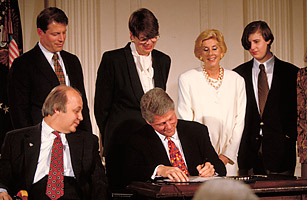
In the aftermath of John Hinckley's assassination attempt on President Reagan in March 1981, authorities discovered that he had purchased the revolver by providing a fake address and identification. Sarah Brady — wife of Jim Brady, the Reagan press secretary who was paralyzed after being shot in the head — began a campaign to require a simple background check on anyone wishing to purchase a gun. While the Brady Act (sometimes known as the Brady Bill) was introduced to Congress in 1987, it would take seven years before the endlessly reworked legislation finally became law. The National Rifle Association fought the bill with an intense, well-funded lobbying campaign. In the end, the Brady Bill was only able to pass during Thanksgiving break, when a mere three Senators were present to vote on it. All three supported the bill, prompting Vice President Al Gore, then presiding over the Senate, to declare the bill's "unanimous" passing.
Once the Brady Bill was signed into law in 1993 — instituting a five-working-day waiting period and background check for any gun purchase — the NRA funded lawsuits that challenged its constitutionality. In 1997, the U.S. Supreme Court ruled that forced federal background checks were unconstitutional; these days, background checks are carried out by state and local officials.